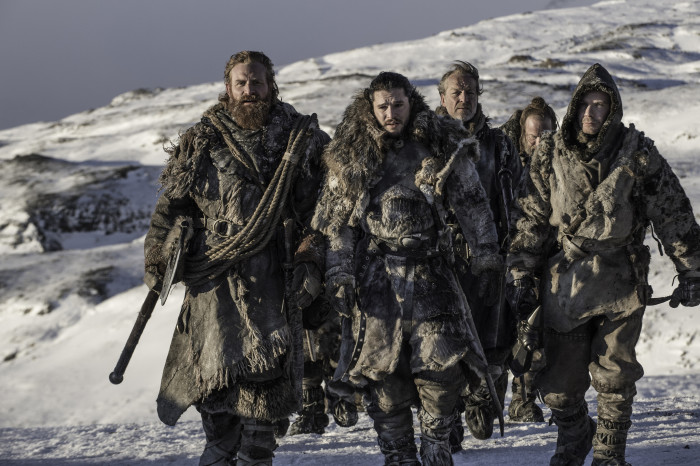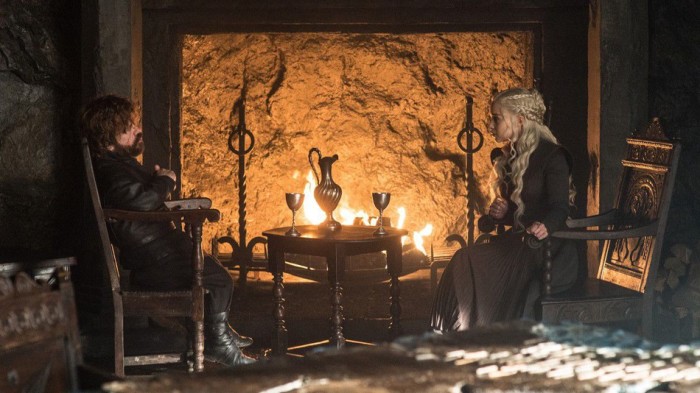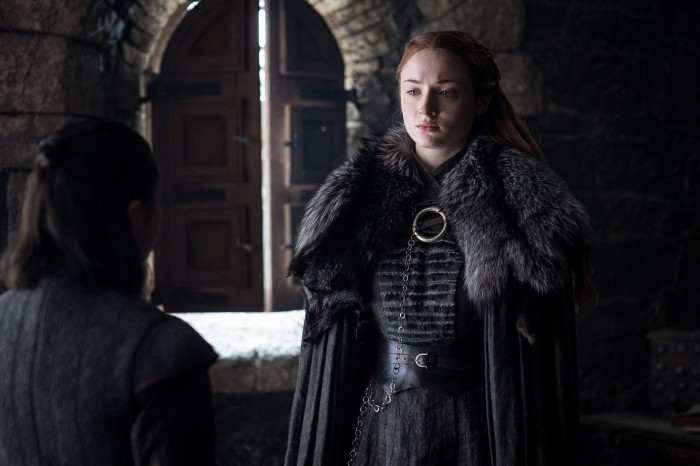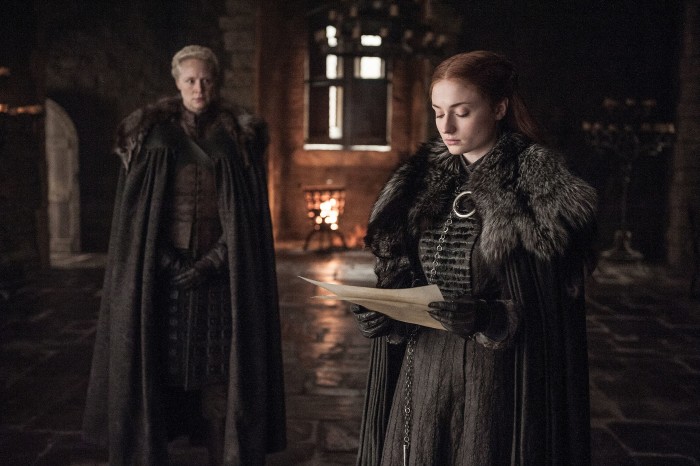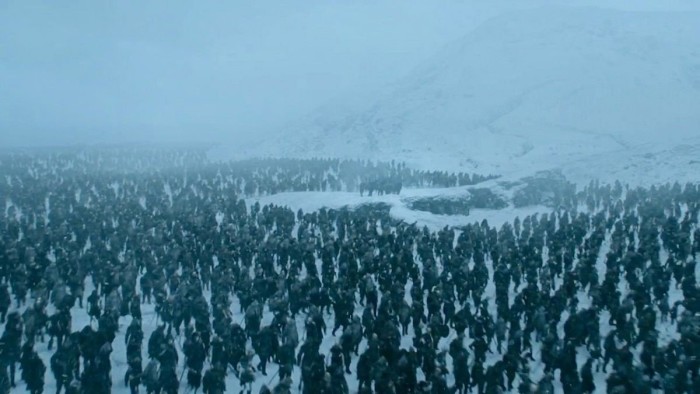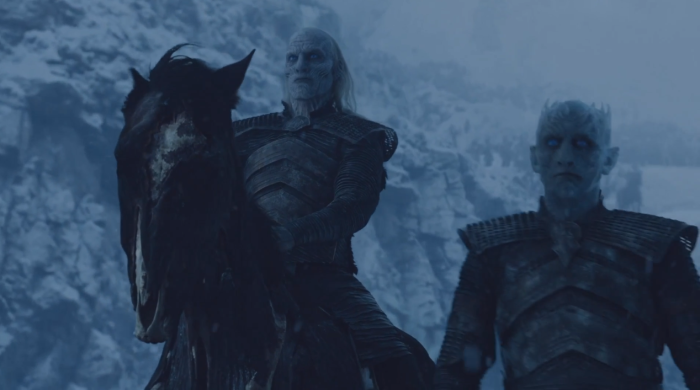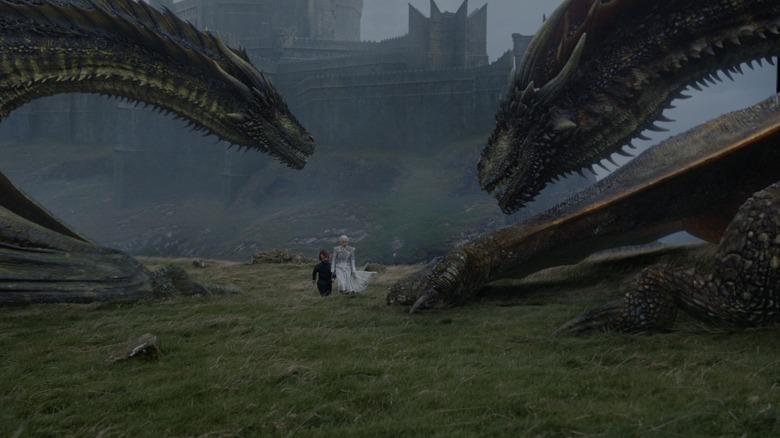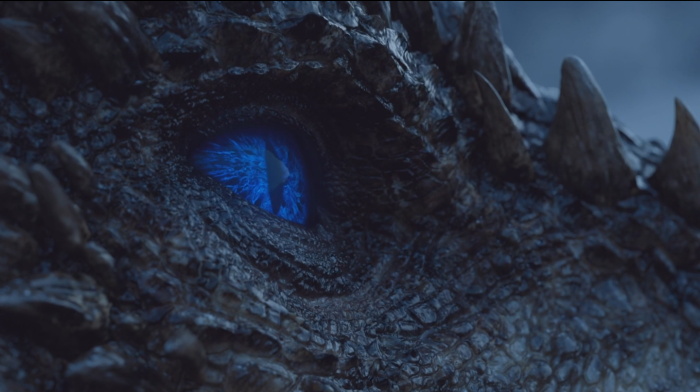'Game Of Thrones' Review: A Sometimes Frustrating Trip 'Beyond The Wall'
(In our coverage of Game of Thrones season 7, we'll be examining each episode with one simple question in mind – which character is winning the game of thrones this week?)
"Beyond the Wall" may be the most frustrating episode of Game of Thrones ever produced. It's a technical marvel, filled with characters we love placed into situations dire and impossible and heartbreaking. It's also a narrative mess, leaning on convenience and deus ex machina and leaps in logic to get where it needs to go. Game of Thrones season 7 has been on fast-forward since the start, but here's the episode where it stopped being weird and started becoming a concern.
But we'll get to that momentarily. Let's start somewhere else.
The Fan Fiction Conundrum
I try to write about Game of Thrones in a vacuum. I don't read other writers' reviews until I've finished my own and I tend to steer clear of social media in the immediate aftermath of an episode. I like to think on an episode before I dive into it, to come to terms with what it wants to accomplish without letting anyone else "contaminate" my thoughts, so to speak. And yet, I broke my own rule in the immediate aftermath of "Beyond the Wall" (mainly because I was curious how folks were responding to the Night King's latest addition to his undead arsenal) and I saw one phrase pop up repeatedly: "That felt like bad fan fiction."
And this drove me up a wall.
There is plenty to criticize in "Beyond the Wall," an hour of television that showcases both the greatest strengths and most painful weaknesses of Game of Thrones season 7, but the "fan fiction" complain is one that I want to address directly here because it's like a piece of chicken stuck in my back molars. I can't get it out. It's driving me crazy.
Fan fiction exists as a form of wish fulfillment, a way for dedicated followers of a fictional world to continue the story they love so much on their own terms. It's a way for unlikely characters to meet (and sometimes bone, because that's how fandom sometimes rolls), a way to explain gaps in story, and to keep the narrative rolling, to keep the dream alive. I've never been a big fan fiction guy, but I understand the appeal. You love something and don't want to let it go. That's perfectly fine.
But Game of Thrones is not something we need to let go yet. It's still being cooked before our very eyes and being served on a weekly basis. We won't be able to define Game of Thrones, to react to it and judge it as a whole complete work, until the credits roll on the final episode. In other words, we don't know what Game of Thrones fan fiction even feels like because the rules of what Game of Thrones is right now, at this very moment, are still being written by the series writers, producers, directors, and cast. Finding an unlikely meeting convenient or an exchange of dialogue too cute for your liking is fine, but the "bad fan fiction" label suggests that the makers of the series are reacting to a finished world and delivering nuggets of wish fulfillment rather than telling the story they want to tell and satisfying the beats they want to satisfy. It's not an honest criticism.
Part of being a fan of anything is a willingness to criticize, to dissect and tear apart and admit that flaws only make something more interesting in the long run. When we talk about what doesn't work in Game of Thrones season 7 (and oh, we'll get there in a little bit), we can talk about them on their own terms. Let's not accuse the world builders of treating their world frivolously. Right now, it belongs to them. The time for fan ownership, of accusations of "bad fan fiction," will arrive in a few years. Let's find a better way to talk about this.
A Series of Conversations
While getting Jon Snow, Tormund Giantsbane, Sandor Clegane, Jorah Mormont, Beric Dondarrion, Thoros of Myr, and Gendry in one location for their expedition beyond the wall required some serious plot acrobatics, it was all worth it. These seven, plus a handful of wildling red shirts, make for one hell of a team. While the massive battle they fight in the back half of "Beyond the Wall" is the intended highlight of the episode, it's the long trek to the battle that proves more memorable.
With nothing to see except snow and nothing to do except anticipate death at the hands of an undead army, this eclectic crew finds themselves in conversations that range from hilarious to moving. Tormund's continued pining for Brienne, even from afar, is the gift that keeps on giving. Gendry finally gets to give Beric and Thoros a piece of his mind four seasons after they sold him to a red witch so she could use his blood to assassinate kings. Jon Snow and Jorah share a quiet moment where they discuss the fate of Longclaw, the Valyrian steel sword that was supposed to stay in House Mormont before Jorah fled Westeros and his father gave it to a fresh recruit of the Night's Watch.
Few of these conversations needed to happen, but they add texture and character to a season that always seems winded from sprinting toward the endgame. These seven men, all so very different from the next, make for the most exquisitely entertaining ragtag team-up Game of Thrones has ever crafted (and we've seen plenty of awesome ragtag team-ups on this show). Watching each of them pair off to share a few words could fall into the "wish fulfillment" issue we talked about above, but after all these years, Game of Thrones has earned the right to bring these disparate characters together.
However, this is one area where season 7's faster pace proves to be a double-edged blade: I would have gladly watched this crew march toward certain doom for a few more episodes.
One More Conversation
While our gruff, grizzled, bearded men-on-a-mission kill time with conversation north of the Wall, another vital conversation takes place at Dragonstone. Tyrion Lannister, making good on his vow to give his queen some tough love after she scorched the Tarly family with her dragons, has a tough conversation. And it does not go well.
For years, we've cheered on Daenerys Targaryen as she's fought (and won) all kinds of righteous battles. In the continent of Essos, her black-and-white, good versus evil approach to the world seemed to get the job done. The bad guys got melted by dragon flame. Slaves were freed. Things only went to s*** when other bad guys stepped into stab her in the back.
But Dany's tactics take on a different tone in Westeros, a continent we understand more than we ever did Essos. The land across the Narrow Sea was a world of strangers, of magic and superstition and one-off characters who often only existed to push Daenerys one step closer toward conquering her homeland. This is no longer true. Sure, Randyll Tarly wasn't a nice guy (but Dickon seemed like a decent fellow), but he was still Samwell's father. He was still the kin of a character we love.
This new context is not lost on the audience and it's not lost on Tyrion. When he tells Daenerys that she needs to understand how her enemies think, he might as well be talking about us. After all, we've grown to love (and sometimes love to hate) just about every major character on this show. Even when they're despicable, we admire them. We can understand where they're coming from. To Daenerys, Jaime Lannister isn't the broken, complex, sometimes cruel, sometimes noble knight who destroyed his reputation to save a city – he's the son of a bitch who killed her father. Game of Thrones has always been masterful at portraying perspectives, of dealing in those shades of grey, and Tyrion understands the need for Daenerys to better understand the world she's in before she can conquer it.
But Daenerys, one of the most stubborn people in a cast full of thick-skulls, isn't having it. This exchange between Dany and her Hand provides as many fireworks as the later battle sequence. Tyrion's words are full of wisdom, yes, but his words have also let them down before. And while tempers flare and voices are raised, this conversation can't help but feel...healthy? Like something is being done? Isn't this what a good Hand of the King/Queen does? To be the sole individual with the right amount of nerve, power, and insight to butt heads with the ruler of the land? If the king s***s and the Hand wipes (to paraphrase season 1), then Tyrion is acting as responsibly as possible: the Mother of Dragons makes the glorious mess and the Imp has to spin it.
Of course, Daenerys is also rightfully suspicious of why the brother of her greatest enemy is so interested in a line of succession. After all, it's all a matter of perspective. But you already knew that.
A Rift in House Stark
Littlefinger gets what Littlefinger wants, and last week, we saw that he wanted to drive a wedge between the two Stark Sisters. In "Beyond the Wall," he gets what wanted – and then some. Arya Stark, shaped to be suspicious of anyone and everyone by a world that has battered her around for seven seasons, is convinced that her pretty princess of a sister may not be as loyal to House Stark as she claims to be. Sansa Stark, shaped to be tougher than most by a world that has used and abused her for seven seasons, is convinced that her creepy weirdo of a sister is up to no good in a major way.
Of course, we know that these two are more similar than they could possibly imagine: the world has chewed up the Stark women and spit them out, but they've risen stronger than ever. But their strength manifests in different ways: Arya is about action and Sansa is about caution and neither one of them realizes that one needs the other to survive.
Instead, we have to watch two of Game of Thrones' best characters drift apart during a time when their bonds should be stronger than ever. Arya simply cannot comprehend the political web that her older sister has to navigate to keep the North from falling apart. Sansa simply cannot comprehend why her younger sister has a satchel full of faces. Families are weird.
Will these two realize that they're being played? And if so, how do you go about disposing of the fox (mockingbird?) in your midst, especially since he's the reason you're still alive? That's the question to ask going into the season finale, but it all hinges on these two sisters realizing that they're united by more than just blood. They're united by the desire to remake a world that has stacked the deck against them.
Meet Me in King's Landing
While Sansa deals with her weirdo sister and her bag of faces, she also has to run the house and keep the neighbors happy. It's a tough gig, the kind of tough gig that will keep her from making a road trip to King's Landing for talks of a potential armistice. But like anyone who has ever used work as an excuse to get out of another obligation, it's clear that Sansa simply has no interest in returning to the castle where she was physically and psychologically abused for years. No, thanks.
So in an interesting little turn, she decides to send the endlessly loyal Brienne of Tarth as her representative at the talks. It's a smart move because Brienne is a worthy Stark rep – she's brave, determined, and straightforward (sometimes to a fault). It's also a dumb move because she's ending away her fiercest protector right when her sister is pointing knives at her and talking about training to be a Faceless Man in Braavos. Then again, Sansa could be the first Stark to be playing a game of three-dimensional chess and she's sending Brienne away because she's too noble and would probably stand in the Stark girls' way if they plan to reconcile and team up to deal with Littlefinger. If so, we're seeing a pinch of Lannister being added to the Stark recipe, and that's a good look.
In any case, Brienne is heading south, where she'll get to reunite with Jaime Lannister again. Since she's always been a little Jiminy Cricket on the Kingslayer's shoulder, it'll be fascinating to see how (or if) she can counteract the machinations of Cersei. After all, Jaime will do a lot of things for love and, whether he's ready to admit it or not, he certainly loves the lady knight from the Sapphire Isle like a sister. You know, one he doesn't have sex with.
Death is the Enemy
As expected, Jon Snow's mission to capture a wight goes about as wrong as you'd think it would and our seven heroes (and a handful of red shirts) find themselves trapped in the middle of a frozen lake, surrounded by the army of the undead. It's intense. It's magnificently staged. It's a breathtaking setpiece that would have felt downright impossible a decade ago. It's a technical wonder. It's also a sequence that pulls its punches in a major way, even as it delivers one final, painful jab to the gut.
But we'll talk about what doesn't work here in a moment, because I want to take a moment to focus on what does work. There's palpable desperation to every moment here – the magnificent sense of claustrophobia as the undead close in; the way our team of ultimate badasses stare at the undead with fear and wonder and, ultimately, frustration; how Sandor Clegane's rock-throwing, an aggressive act from an aggressive man, triggers that final assault. And of course, there's Thoros of Myr, already wounded by an undead bear, who freezes to death in the middle of the night. He was never a major character, but the moment still stings. We feel the loss through Beric and Jon and Jorah, characters we love who knew him or knew of him.
But no one has time to grieve. They only have time to burn the body. There's no use in letting their friend join the ranks of the enemy.
It's the calm moments that sell the action. Watching our surviving heroes, some of the strongest and most beloved characters in Westeros, slowly freeze in the face of an enemy that cannot feel the chill, is ultimately more powerful than the visual effects extravaganza that follows. By now, we expect Game of Thrones to deliver spectacle, so it's the human touches, the painful moments, that stand out.
And then there's that final, desperate stand. Tormund is rescued from a pack of wights by Sandor Clegane, two men united because they continue to draw breath. Jon Snow and Jorah share a telling look, two strangers united by a web of relationships whose roots stretch back years and years. And when all hope is lost, Daenerys flies to the rescue with her dragons, frying wights...only for poor Viserion to be struck down by the Night King himself, doing what Bronn could not. As staged by Game of Thrones veteran Alan Taylor, the battle is a masterclass in small screen spectacle. It's unapologetic fantasy (zombies and knights and barbarians and dragons!) in a series that has slyly hidden its geekiness beneath politics and sex. It's a delight.
But that delight is tinged with pain. In an episode where a few too many characters wear plot armor, the death of one of Daenerys' children is a powerful blow. As the cast escapes on the back of Drogon, it's a startling defeat. Ice and fire have finally met...and ice has won round one.
Plot Armor and Convenience
Okay, but let's talk about what doesn't work.
All of the problems that have been building throughout Game of Thrones season 7 come to a head in "Beyond the Wall," robbing that climactic battle of some of its power because we're too busy asking questions. Questions like "Wait, how long did it take Gendry to run all the way back to Eastwatch?" and "Whoa! Who just died? Was that someone important?" and "How long does it take a raven to fly to Dragonstone?" and "How did every character we actually like survive that battle?" and "Why was Benjen Stark there at all?"
One or two of these questions wouldn't have been a problem, but "Beyond the Wall" asks viewers to suspend their disbelief in ways that no previous Game of Thrones episode has asked before. After six years of being paced like a novel, the series started to pace itself like a movie this season, and I've written before about how odd this has felt. But I've been able to roll with it (this is a shorter season and it's had to move faster) up until now. The logical leaps this episode makes are frequently absurd, skipping the vital scenes where the pieces are moved and jumping right to the scenes where the pieces get knocked over. This means "Beyond the Wall" is an entertaining collection of scenes and sequences rather than a great hour of television. Game of Thrones felt weird when it moved at a sprint, but this is the first time in season 7 that it has outright stumbled.
In a series that defined itself by showing no mercy, a ragtag team of fan-favorites survive impossible circumstances, protected by plot armor in a show that once proudly declared that no one is safe. In a series defined by the importance of distance, a guy who was born and raised in the south is able to sprint all the way back to Eastwatch in what looks like a matter of hours. In a series where life and death are treated as a Big Fucking Deal, the surprise return of Benjen Stark just so he can die seconds later feels like a cheat. He showed up to give Jon Snow a horse because, for some reason, Jon decided to fight more zombies rather than climb on the back of Drogon like a smart person. Look, I know we like to make jokes about how the Starks are dummies, but here's an example of a character being dumb just to milk some unnecessary drama out of an already dramatic scenario. A dragon was just killed by a demon with an ice spear! Why does Jon have to fall into the water and fight more zombies and inexplicably meet Benjen, only to end up in the exact same place as his allies just a few minutes later? It's additional spectacle for the sake of spectacle, not plot or character.
"Beyond the Wall" is guilty of throwing stuff at the screen for the sake of throwing stuff at the screen. It's frequently powerful and frequently frustrating. Even frustrating Game of Thrones tends to be good Game of Thrones – the death of Viserion is burned upon my brain and the look of utter despair on Daenerys' face sells the demise of a CGI fantasy beast. A mother has lost a child and it's downright dizzying in how much it hurts. In an hour that was too convenient in its plotting and too convenient for its lead characters, this landed as intended. As we continue to rush to the end, this will be an ongoing issue: the destination is worth it, but how bumpy will the road be?
An Alliance of Ice and Fire
A dragon may dead, but the mission actually worked: they have a wight and the team is en route to King's Landing. And more importantly, Daenerys saw the army of the dead with her own eyes and has pledged to devote her energies to fighting the real war. And most importantly, Jon Snow has bent the knee to Daenerys Stormborn of House Targaryen, forming an alliance that could actually stand a chance against the Night King (and Cersei, but that's a conversation and a battle for another day). Oh, and most importantly, Dany and Jon made eyes at each other as the camera made sure we saw Jon's sculpted abs. Never mind that they're secret aunt and nephew. Those crazy kids are going to get it on.
The Players
We're starting to see a clear pattern for Jon Snow: he picks a noble battle, marches in bravely, and then gets his ass kicked in a genuinely profound way that makes you question whether or not he should actually be leading anything. He is not winning the game of thrones this week.
In Winterfell, Littlefinger's plan to drive the Stark sisters apart is going along swimmingly. But it's an operation in progress. Anything can go wrong. What is clear is that Sansa and Arya, so effectively manipulated, aren't winning anything this week.
And since Daenerys is down one dragon, there's no way she can claim victory here. Sure, her loss triggered a new and powerful alliance with Jon Snow, but the promise of future victories is not a victory right now. She can only grieve.
So that brings us to the clear winner of "Beyond the Wall" and the only leader on the continent who seems to have his act together in every possible way: the Night King. Hey, when you're an ancient demon with an army you don't have to feed or shelter, it's pretty easy to dominate. Especially when you now have a dragon on your side.
Currently Winning the Game of Thrones: The Night King

